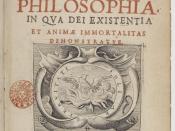"I think, therefore I am"
The statement "I think, therefore I am" lays the groundwork for Renè Descartes' argument in the Meditations. To understand this expression, one must put themselves in Descartes' place. He started off trying to figure what he can know with certainty. He examined a large body of knowledge and figured out that he cannot be certain of any knowledge at all. Beginning in Meditation Two, Descartes searches for the something that must be true no matter what. This led to the conclusion that he does in fact exist if he can still think. It is from this Archimedean Point that Descartes goes on to build a new, well-built body of knowledge about his existence and God's existence. The statement "I think, therefore I am" cannot be doubted.
Descartes felt that that the power of thinking or sensing has nothing to do with the physical body. If he could cease all thinking than he could cease to exist.
A thing that thinks is "a thing that doubts, understands, affirms, denies, wills, refuses, and that also imagines and senses"(Descartes 20). There is a clear separation between the mind and the body. If the body exists, it does not mean the "I" exist. The mind is something that is thinking, indivisible, and non-extended while the body is something that is non-thinking, divisible and extended. He believes in the standard of perfection, which must be separate from his mind because of the imperfection in his thinking.
A common objection to Descartes' theory is that an evil demon could be making one think that "I am". Descartes' reasons for doubt are that his senses are misleading him, the possibility of him dreaming, or the mischievous God that dwells on deceiving him. Even if he was being deceived, he is still a...



"I think, therefore I am"
Very interesting and well-said. Good job.
2 out of 2 people found this comment useful.